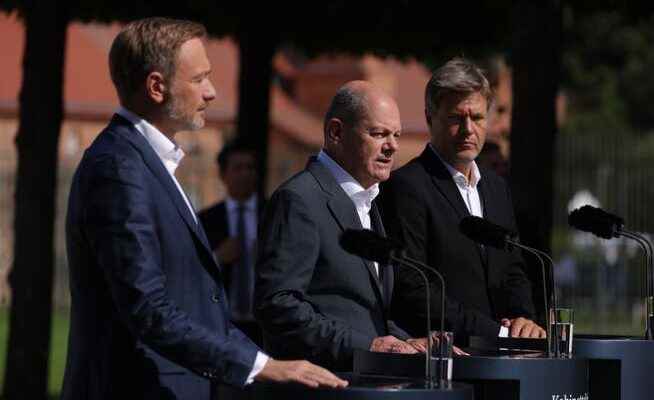The German “traffic light” government and the leaders of the parliamentary groups are negotiating in the Chancellery about making things easier for the citizens. These are groaning under record inflation and high energy prices.
A moment ago in Meseberg, now back in the Chancellery: Federal Finance Minister Christian Lindner, Federal Chancellor Olaf Scholz and Economics Minister Robert Habeck on August 31 at the cabinet meeting. This Saturday, relief for citizens will be negotiated in Berlin.
On Saturday morning, the heads of the “traffic light” government and the factions in the German Federal Chancellery came together to decide on the third “relief package” for citizens who are groaning under high inflation and enormously increased energy prices. At a cabinet meeting in the middle of the week, the Social Democratic Chancellor Olaf Scholz announced a relief package that was “as tailor-made as possible, as efficient as possible, as targeted as possible”.
Among other things, targeted help for pensioners and students, tax cuts and a successor regulation for the 9-euro local transport ticket are under discussion. The pressure has also increased because, contrary to what was previously expected, Russia is now no longer supplying any gas through the Nord Stream 1 pipeline. In the event of a gas shortage, Green Foreign Minister Annalena Baerbock had already conjured up the scenario of “popular uprisings” at the end of July. Protests are already emerging: this Monday there will be seven demonstrations in Leipzig. Many people cannot afford the exorbitantly increased electricity prices, and the first companies are also closing, which in turn threatens jobs.
So far, the electricity price surcharge to promote renewable energies (EEG surcharge) has already been abolished, there is an energy flat rate of 300 euros for all employees and a one-off payment of 100 to 200 euros for all unemployed, child benefit has been increased once by 100 euros per child, three The fuel price was supported for months up to August and there was a 9-euro ticket for local public transport for the months of June, July and August.
Before the coalition committee, politicians and associations tried to steer the talks in the desired direction. In the Düsseldorf “Rheinische Post”, the Green Federal Family Minister Lisa Paus called for an increase in child benefit at least to the level of inflation compensation. Other voices called for housing benefit increases and an energy price cap for low-income households.
The Association of Towns and Municipalities spoke out in favor of a climate ticket based on the Austrian model. With this ticket, Austrians can use every bus, every tram and every local and long-distance train and pay 1095 euros per year or reduced 821 euros.
(With agency material. More to come.)
